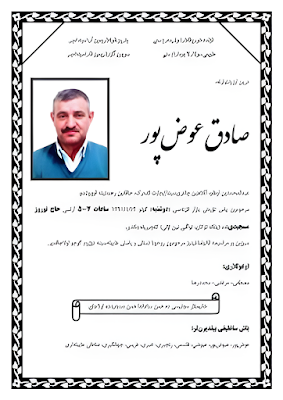 |
| Funeral Announcement for Sadegh Avazpour in Turkish with Arabic Script |
The late Mr. Sadegh Avazpour, whose home in Tabriz was a gathering place for environmental defenders during his life, might not have imagined that his funeral ceremony would also attract attention in Azerbaijan because of the Turkish language.
Mr. Sadegh Avazpour, the father of three activists from Azerbaijan—Mustafa, Morteza, and Mohammadreza—passed away on April 1st. His children, while preparing for his funeral ceremony according to the common tradition in Tabriz, printed funeral announcements and posted them on the doors and walls of the city. Holding a funeral and printing and posting announcements on the walls of the city are not unusual activities, and nothing unusual was written in the announcement either. The only difference was that the announcement was not in Persian. On the day of the funeral, the agents of the Ministry of Intelligence used this as an excuse to arrest his son Morteza Avazpour, along with his cousin Hassan Ranjbar. They also sent agents to arrest another son, Mustafa Avazpour, who was detained a few days later.
 |
| Scan of the summons from the Intelligence Department of the IRGC (Islamic Revolutionary Guard Corps) in Tabriz for Mustafa Avazpour |
The pursuit and arrest of the grieving children of the deceased, solely for printing a funeral announcement in Turkish in Tabriz, is, from any perspective, a racist act that can only be seen in Iran today. It is expected that free-thinking and democratic individuals, regardless of any political or ethnic affiliation, raise their voices against this blatant violation of the rights of mourning people and bring international attention to these despicable and racist actions of the Islamic Republic.
Original Text in Farsi
